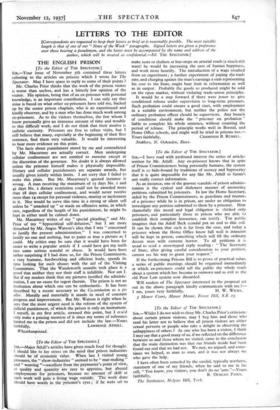[To the Editor of THE SPECTATOR.] SIR, —Major Adult's artieles have
given much fOod for thought: I should like to lay stress on the need that 'prison industries should be of economic Value. When last I visited • young prisoners, the " 'show-industries " seemed to be " mat-making " and " weaving "—excellent from the paymaster's point 'of view, as quality and quantity are easy to appraise, but absurd employments for prisoners, because no amount Of skill at such work will gain a living wage outside.' 'The work done should have worth in the :prisoner's eyes ; if he were set to
make seats or shelters at bus-stops on arterial roads (a much-felt want) he would be increasing the sum of human happiness, and work more heartily. The introduction of a wage resulted from an experiment; a further experiment of paying the trade rate, and charging against the man's earnings a sum representing his cost to the State, might bear fruit in reformation as well as in output. Probably the goods so produced might be sold on the open market, without violating trade-union principles.
It would be a step forward if there were power to give conditional release under supervision to long-term prisoners. Such probation- could ensure a good start, with employment in a suitable environment, but neither the police nor the ordinary probation officer should be supervisors. Any breach of conditions should make the " prisoner on probation " liable to complete his whole sentence, without counting the period of release. The principle works well in Borstal, and Horne Office schools, and might well be tried in prisons too.—














































 Previous page
Previous page